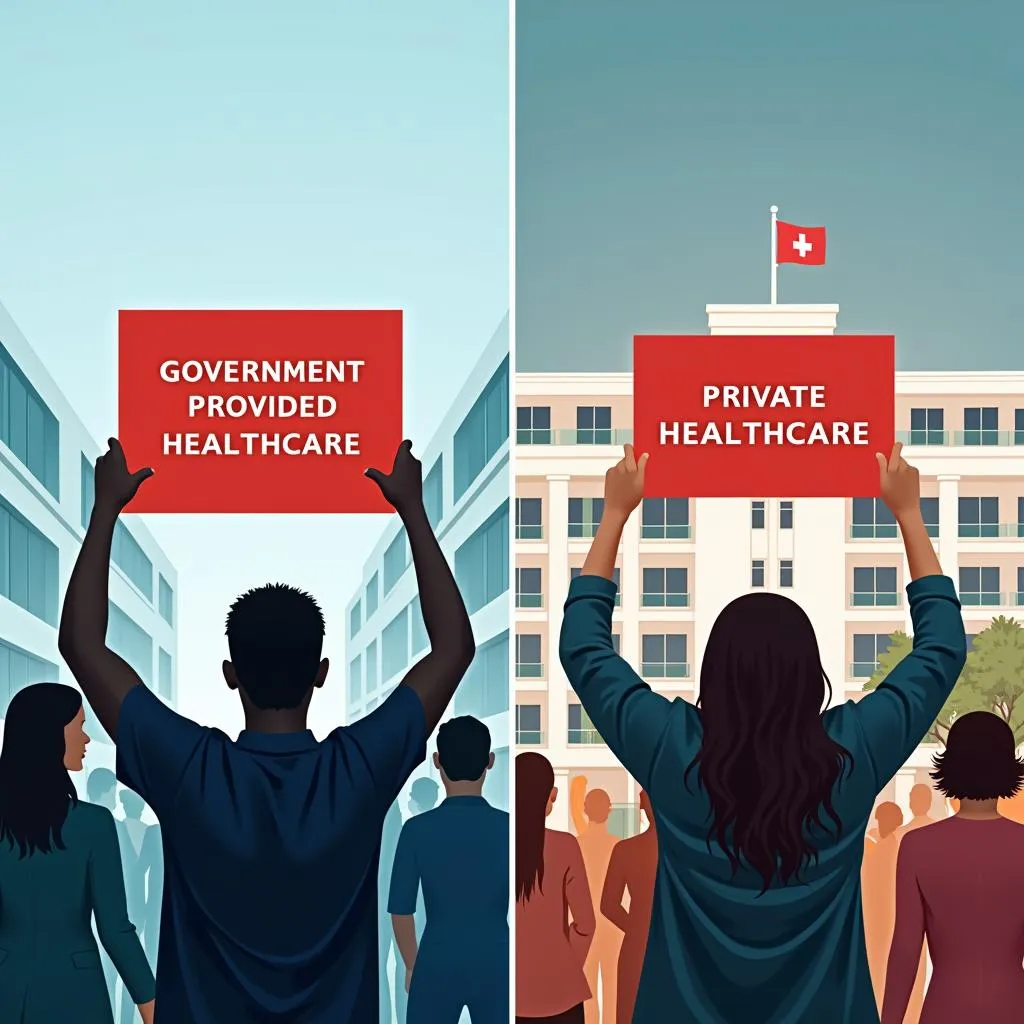The topic of how public policy influences healthcare access is increasingly relevant in IELTS Writing Task 2. Based on recent trends, this theme has appeared frequently in past exams and is likely to continue as a significant subject in future tests. Let’s explore a sample question that reflects this important issue:
Some people believe that governments should be responsible for providing healthcare to all citizens, while others think individuals should pay for their own health services. Discuss both views and give your own opinion.
This question encapsulates the core debate surrounding public policy and healthcare access. Let’s analyze the question and provide sample essays for different band scores.
Question Analysis
This question requires candidates to:
- Discuss the view that governments should provide healthcare for all citizens
- Discuss the opposing view that individuals should pay for their own health services
- Provide their own opinion on the matter
It’s crucial to address all parts of the question and provide a balanced discussion before presenting a clear personal stance.
Sample Essay 1 (Band 8-9)
Healthcare provision is a contentious issue in many societies, with differing opinions on whether it should be a government responsibility or an individual one. This essay will examine both perspectives before presenting my own view.
Those who advocate for government-provided healthcare argue that it ensures equal access for all citizens, regardless of their economic status. They contend that health is a fundamental human right and that a healthy population contributes to a more productive and stable society. Moreover, a centralized healthcare system can potentially reduce costs through economies of scale and eliminate the profit motive that often drives up prices in private healthcare systems. Countries like the United Kingdom and Canada have demonstrated that universal healthcare can lead to better overall health outcomes and reduced healthcare-related financial stress for citizens.
On the other hand, proponents of individual responsibility in healthcare argue that it promotes personal accountability for one’s health choices and reduces the burden on taxpayers. They believe that a privatized system encourages innovation and competition, potentially leading to higher quality services and more efficient healthcare delivery. Additionally, they contend that government-run systems often result in longer wait times and reduced patient choice, as seen in some countries with universal healthcare.
In my opinion, while there are merits to both arguments, I believe that a hybrid system combining government support with individual responsibility is the most effective approach. Governments should provide a basic level of healthcare coverage to ensure that all citizens have access to essential medical services. This could include preventive care, emergency services, and treatment for chronic diseases. However, individuals should also have the option to purchase additional private insurance or pay out-of-pocket for non-essential treatments or premium services.
This balanced approach would ensure that no one is left without basic healthcare while still allowing for personal choice and maintaining incentives for innovation in the healthcare sector. It would also address the ethical imperative of providing care for the most vulnerable members of society while encouraging individuals to take an active role in managing their health.
In conclusion, while both government provision and individual responsibility have their merits in healthcare, a combined approach that leverages the strengths of both systems is likely to yield the best outcomes for society as a whole.
(Word count: 345)
 Debate on public policy and healthcare access
Debate on public policy and healthcare access
Sample Essay 2 (Band 6-7)
The question of who should be responsible for healthcare costs is a big issue in many countries. Some people think the government should pay for everyone’s healthcare, while others believe individuals should pay for their own. This essay will look at both sides and give my opinion.
People who think the government should provide healthcare say it’s fair for everyone. They believe health is a basic right and that when everyone is healthy, the whole country benefits. Government healthcare can also be cheaper because it’s a big system and doesn’t need to make a profit. Countries like the UK show that this can work well.
On the other hand, people who think individuals should pay for healthcare say it makes people more responsible for their health. They think private healthcare leads to better services because companies compete with each other. They also say that government healthcare can have long waiting times and less choice for patients.
In my opinion, I think a mix of both ideas is best. The government should provide basic healthcare for everyone, especially for poor people and emergencies. But people should also be able to buy extra healthcare if they want. This way, everyone gets basic care, but there’s still room for choice and better services.
This system would make sure no one is left without healthcare, but also keeps some of the good things about private healthcare. It’s important that everyone can see a doctor when they’re sick, but also that people take care of their own health.
To conclude, while both sides have good points, I believe a system that combines government healthcare with some individual responsibility is the best way to keep everyone healthy and happy.
(Word count: 275)
Sample Essay 3 (Band 5-6)
Healthcare is very important for everyone. Some people think the government should pay for it, but others say we should pay ourselves. I will talk about both ideas and give my opinion.
People who want the government to pay for healthcare think it’s good for everyone. They say health is important and everyone should have it. When the government pays, it can be cheaper because it’s a big system. Some countries like England do this and it works well.
But other people think we should pay for our own healthcare. They say this makes people take better care of themselves. They also think private hospitals might be better because they try to be the best. But sometimes government healthcare can be slow and you can’t choose your doctor.
I think both ideas have good points. Maybe it’s best to have both. The government could pay for basic healthcare for everyone. This is good for poor people and emergencies. But people can also buy extra healthcare if they want something special.
This way, everyone can see a doctor when they are sick. But people who want extra care can get it too. It’s important that everyone can get help when they are sick, but also that people try to stay healthy.
In conclusion, I think a mix of government healthcare and people paying for some things themselves is the best idea. This can help keep everyone healthy and happy.
(Word count: 226)
Explanation of Band Scores
Band 8-9 Essay:
- Fully addresses all parts of the task with a well-developed response
- Presents a clear position throughout the response
- Uses a wide range of vocabulary with very natural and sophisticated control of lexical features
- Uses a wide range of structures with full flexibility and accuracy
- Demonstrates coherence and cohesion through skillful paragraphing and use of cohesive devices
- Provides relevant, extended, and well-supported ideas
Band 6-7 Essay:
- Addresses all parts of the task, though some parts may be more fully covered than others
- Presents a relevant position, though conclusions may be unclear or repetitive
- Uses an adequate range of vocabulary for the task, with some errors in word choice and collocation
- Uses a mix of simple and complex sentence forms with some errors that do not impede communication
- Arranges information coherently and uses a range of cohesive devices, though not always appropriately
- Presents relevant main ideas but some may be inadequately developed or unclear
Band 5-6 Essay:
- Addresses the task only partially, with limited development of ideas
- Expresses a position but development is not always clear
- Uses limited range of vocabulary, with noticeable errors in spelling and word formation
- Uses only a limited range of structures, with frequent errors that may cause some difficulty for the reader
- Presents information with some organization but lacks overall progression
- Presents some main ideas but these are limited and not sufficiently developed
Key Vocabulary to Remember
- Contention (noun) – /kənˈtenʃən/ – a heated disagreement
- Advocate (verb) – /ˈædvəkeɪt/ – to publicly support or recommend a particular cause or policy
- Fundamental (adjective) – /ˌfʌndəˈmentl/ – forming a necessary base or core; of central importance
- Centralized (adjective) – /ˈsentrəlaɪzd/ – controlled by a single authority
- Imperative (noun) – /ɪmˈperətɪv/ – an essential or urgent thing
- Proponent (noun) – /prəˈpəʊnənt/ – a person who advocates for something
- Incentive (noun) – /ɪnˈsentɪv/ – a thing that motivates or encourages someone to do something
- Vulnerable (adjective) – /ˈvʌlnərəbl/ – susceptible to physical or emotional harm
- Leverage (verb) – /ˈliːvərɪdʒ/ – use (something) to maximum advantage
- Hybrid (noun/adjective) – /ˈhaɪbrɪd/ – a thing made by combining two different elements
In conclusion, the topic of public policy and healthcare access remains a crucial issue in IELTS Writing Task 2. The impact of public policy on healthcare access is likely to continue appearing in future exams. To prepare, candidates should practice writing essays on related topics such as:
- The role of government in funding medical research
- The impact of privatization on healthcare quality
- The importance of public health funding in disease prevention
Remember to analyze the question carefully, plan your response, and practice writing within the time limit. Feel free to share your practice essays in the comments section for feedback and discussion. Good luck with your IELTS preparation!


